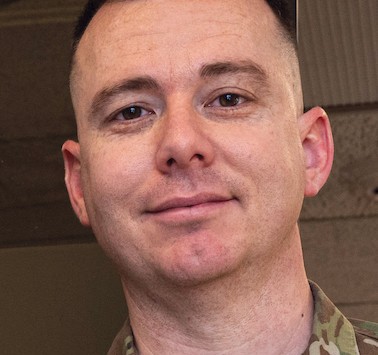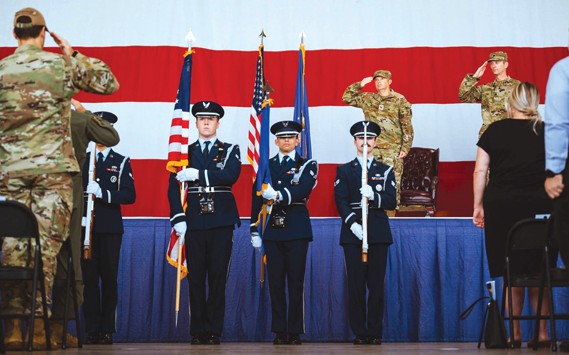ORLANDO, Fla. — Air Force Chief of Staff Gen. David L. Goldfein on Feb. 27 approved immediately updating a crucial verse of the official Air Force song to make it inclusive and to “reflect all of us and who we aspire to be.”
Goldfein made the announcement about changes to the third verse to more than 2,000 Airmen, industry officials and retirees during a joint appearance with Chief Master Sergeant of the Air Force Kaleth O. Wright at the Air Force Association’s Air Warfare Symposium.
The third verse serves as the U.S. Air Force Academy’s school song and is sung after athletic games. Goldfein also suggested further changes to the Air Force song might be considered.
“I want to open a conversation here, which I hope to have over the next few months about whether we also want to update the first verse,” he said. “I can tell you a number of stories of women who have been giving them the gun throughout the ages but especially most recently as all combat positions are open.
“So I think it’s an important discussion to have. I’m also very respectful of the fact we’ve been singing the song at funerals and different events. It’s part of who we are and I personally think it’s time to update that to reflect all of us,” Goldfein said.
Goldfein said he vividly understood how the male-centric words clashed with the modern Air Force after the Academy’s women’s volleyball team won a tournament that was held at the Pentagon.
“We (sang) our third verse of the Air Force song, which includes the words, ‘A toast to the host of the men we boast’ and it was very clear to me it was an exclusive song,” Goldfein said. “Not intentionally, it was written at a different time. But it was exclusive. And the energy of that team couldn’t have been lower. It was just wrong.”
Under the change, the lyrics to the new verse are:
Here’s a toast to the host
Of those who love the vastness of the sky,
To a friend we send a message of the brave who serve on high.
We drink to those who gave their all of old,
Then down we roar to score the rainbow’s pot of gold.
A toast to the host of those we boast, the U.S. Air Force!
Goldfein said he moved slowly, recognizing the status of the song and the emotions it could trigger. “We started down this path and I actually started having a lot of conversations with both men and women about our Air Force song which is a part of who we are and it defines us. The cadets themselves came up with what they thought was the better third verse.”
Goldfein’s explanation during the session with Wright mirrored a deeper discourse he provided Thursday in a published commentary.
Wright embraced the change as well.
“That is a relevant conversation but it has to be balanced against what’s appropriate for our Airmen who are in the Air Force today,” he said. “So the world is changing. The Air Force is changing. Lots of things are changing. We talk a lot about diversity and inclusion; we have to take a look at those traditions that are written and unwritten.
“We got a lot of opinions from males and females, young and old about this,” Wright said. Goldfein “made sure he had a real kind of global perspective on this and what it might mean.”
The discussion of the Air Force song was one part of a broader conversation and question period Goldfein and Wright had with those in the auditorium. The hour-long session touched on topics as diverse as leadership and what the Air Force is doing to reduce the number of suicides, to the legacy that Goldfein and Wright hope to leave when their tenures end (June 30 for Goldfein and in September for Wright.)
How the change will ultimately be received is unclear, but when Goldfein announced the new lyrics there was sustained applause in the auditorium.
Goldfein also insisted that his personal experience with modern warfare affirmed his decision.
“As chief I visit Arlington a lot … especially on Memorial Day and I visit all the Airmen I lost that were under my watch when I was a commander in Central Command,” Goldfein said in explaining why the male-only references in the third version were replaced by lyrics that are gender neutral.
“And side by side there were men and women. Combat is like that. Combat doesn’t discriminate and neither should we,” he said.












